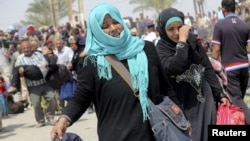As Iraqi military and paramilitary forces are mounting a counteroffensive against Islamic State fighters in Anbar province, residents in Baghdad are rattled by the militant group's success just 110 kilometers to the west. Speaking from the capital on May 24, Alhurra TV news director Rafal Mahdi updated VOA on the latest operations in and around Ramadi, and what demands Shi'ite militias have made in exchange for their help on the conflict's newest frontline.
Q. What the most recent news from Anbar province or Ramadi?
A. Several areas of Anbar are still under control of ISIS, while ISIS is still trying to get to the other areas, such as Amiriyat al Fallujah and Al-Khalidiya, which is a district in Habbaniyah. At the same time, ISIS has completely surrounded - 360 degrees - the two cities of Haditha and Baghdadi, whose citizens continue to suffer (from a) lack of food and water. However, security forces supported by tribal fighters still remain in the cities, but with weak capabilities when compared to ISIS, that has secured weapons and military vehicles left by the retreating army forces and police.
Q. What groups are fighting Islamic State right now?
A. Military units, the federal police, the army, and the Golden Unit (Iraqi special forces), along with tribal fighters from Anbar, are moving towards Ramadi. Simultaneously, special security forces attached to Baghdad operations are deployed around Baghdad. Units of Popular Mobilization announced their conditions to participate in the liberation of Anbar, among which is the endorsement of a National Guard law and the cessation of American airstrikes.
Q. What's the mood in Baghdad right now, given everything that's happened in the last week - including the takeover of Ramadi?
A. Since last year, following the fall of Mosul and Salahuddin provinces to ISIS, the general mood in Baghdad has been tense on the economic front... The fall of Anbar to ISIS -- despite the government's previous declarations (about) it's ability to confront ISIS - has further shaken the confidence of Iraqis in their government.
Q. On Friday, Iraqi Vice President Ayad Allawi criticized the U.S.-lead airstrikes, saying that they were ineffective, that there's no strategy. Is he the only official voicing these concerns?
A. No, I'm afraid not. The statements by the Iraqi vice president were not the first to criticize the U.S. airstrikes.
Other politicians have pointed out the benefit of these airstrikes in the face of continuing influx of ISIS fighters across the border of Syria into Iraq, and vice-versa, in comparison to the military objective announced by ISIS. (But) it seems that US airstrikes, in the opinions of some politicians, have not been effective.
Q&A: Alhurra's Rafal Mahdi on Islamic State Battle for Anbar




